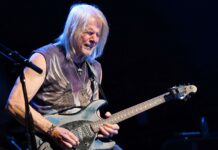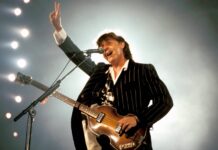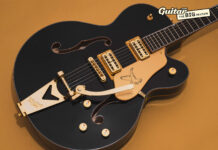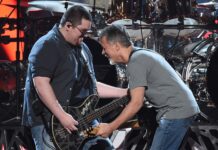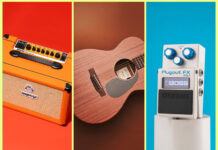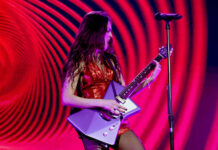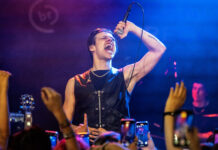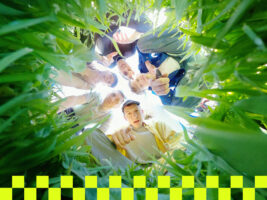
Squid: “We feel like our strongest work is when it comes in a confusing way”
If ever an album title felt unfitting of its progenitors, then surely it is UK band Squid’s third album Cowards. The Brighton jazz-art-rock hybrid have equally confounded and captivated listeners and critics with their complex, jagged explorations in genre.
Ollie Judge, lead singer and drummer is joined by guitarists Louis Borlase and Anton Pearson, bassist Laurie Nankivell and multi-instrumentalist Arthur Leadbetter. Borlase and Pearson joined Guitar.com at the distinctly un-rock ’n’ roll hour of 9am to talk about their new full-length: “It’s fine,” shrugs Pearson, “we’re not a rock ’n’ roll band, anyway.”
READ MORE: Johnny Marr on signature guitars, the power of acoustic and his new seven-string model
Understandably, Cowards is not a self-referential title. Rather, the nine tracks are self-contained stories about charismatic, sociopathic, dictatorial characters with malicious intents (the world is not short of suitable case studies for that character type right now). Lead single Crispy Skin takes inspiration from the futuristic novel Tender Is The Flesh, in which humans consume one another, even purchasing human flesh from supermarket shelves.
“We’re not trying to be really, explicitly political,” Pearson explains from his Brighton home. “I think we’re more interested in exploring different characters, moods and environments. We never would have a really specific, coherent, clear political message. It’s not really how we work. Everything’s a bit more oblique with us, and confusing, and we’re still trying to understand all of it. Because everything comes from the five of us equally, so we’re not really interested in everything having a totally uniform message between us. We feel like our strongest work comes when things come naturally from the five of us in a confusing way. So we’ve kept up with that.”
Image: Harrison Fishman
Collaboration Is Key
Cowards is a rapid follow-up to O Monolith, which was released in February last year, and the band’s debut Bright Green Field in 2021. Clearly they’re a band that has no interest in waiting around, but they’re also one that welcomes external collaboration into their aforementioned confusing creative process. So Cowards sees a diverse cast of guests including Danish experimental songsmith Clarissa Connelly, composer, pianist and singer Tony Njoku, Rosa Brook from punk group Pozi, percussionist Zands Duggan, and Johnny Greenwood collaborators the Ruisi Quartet.
Despite this varied cast of collaborators on board, the process for making the record didn’t push the band outside of what they were used to.
“Nothing felt particularly, intentionally different,” Pearson admits. “I think we were quite happy with how the song structures and arrangements were feeling when we started recording. But, with us there’s always a lot left up to chance in the studio, whether that’s for ourselves or for the additional musicians that we want to write parts for.
“I think we were feeling the most confident that we’ve ever felt with the writing of these songs. A lot of that came from being happy with the space and silence between notes and between parts, and each other, and we didn’t want to ruin that by overcomplicating things. So, it was the first time where we found ourselves with some really, super delicate moments.”
The process this time, as always, relied on lengthy periods of communal jamming and drawing out ideas, variations, and details over weeks and months that allow “the best bits to stick around”, explains Borlase.
“One great thing was, Arthur [Leadbetter] is playing a lot of cello on this album. There was a particular pedal that we’ve never really tried with cello before, and it sounded so characterful. We tried that once at the end of Cro-Magnon Man and, by the end of the album, we replicated that kind of approach across various different songs. It’s a really characterful, quite strange, warbly sound that you can hear across Cowards quite a lot.”
Comfort In Sound
With Cowards being their third go-round, and with the band having honed their skills both on stage and in the studio, Borlase also felt that the dynamic of the band has become more relaxed as their confidence in their abilities grew – a vibe enhanced by a switch in producer.
“We were happy with the two albums that we’ve done,” he explains. “We know we’ve managed to do quite different things with both of them. We thought we’d gotten better as musicians and instrumentalists and all that sort of stuff. So, the whole vibe in the studio was very different, because we did the tracking with [producer] Marta Salogni [and Grace Banks] rather than Dan Carey this time. And they’re both amazing producers, but they just have a totally different approach to recording.
“Dan likes things to be quite tense, and he likes to kind of create that sense of urgency. The first album, we did it in his studio, which is a really small room, and we did it in the heat of summer. We didn’t take lunch breaks and things like that. And it was all about ‘We need to get this record finished!’, and we’re all delirious and hot, and so there was a lot of tension in a really good way. We were all focusing on the art in a really intense way. And then this recording process couldn’t be more different, really.
“Marta is all about making you feel quite relaxed, so we would take little trips to the bakery, you know? I mean, it was like a totally different vibe. Dan also ended up working on this record too, kind of separately. So there’s still some of Dan in it, which is great, as we’re very attached to him as a creative relationship. We’ve got good bits of both of them, so we’re very lucky.”
Faithful Friends
As a lefty, Borlase has learned to rely on a trusted cast of characters for his guitar sounds, including a Martin 000-15 for the acoustic parts, and his Burns Marquee (strung in Nashville tuning) for songs such as Cowards and Fieldworks I and II. When things get a bit more riffy he turned to his USA Telecaster or his Japanese Jazzmaster on singles like Showtime and the country-gothic-tinged Well Met.
An occasional different vibe was added by his Gretsch Electromatic Duo-Jet, which appeared when he needed to add some grit. “I used it quite selectively,” Borlase explains. “It’s a dirty-sounding guitar. I’d never really worked with a dual humbucker, chunky-sounding, short-scale guitar like that. It was used for moments of intensity, and I primarily used it for overdubs in the second half of Fieldworks, where it’s great for those big, stacked slabs. In terms of clean stuff on Fieldworks, we did try using the Gretsch, but we realised it made more sense to hear the [original] guitar parts on harpsichord.”
Pedals were also an unsurprisingly big feature, with Borlase leaning on his trusty Line 6 DL4, Big Muff Pi and Hudson Broadcast… plus some more esoteric players in the shape of the Dr Scientist Bitquest, Alexander Syntax Error, Arion Stereo Chorus, and Keeley Synth 1.
Pearson on the other hand borrowed a 1970s Fender Stratocaster for the recording, but also brought his own Fender Telecaster – which is modded with McNelly T-bar pickups – and a Faith Jupiter acoustic. His pedals included a modified Whammy pedal made by a friend, EQD’s Pyramids and Avalanche Run, a Dwarfcraft Wizard of Pitch, one of EHX’s new Pico POGs and even an ultra-cheap Muzizy Fuzz pedal.
“I used my Faith Jupiter that I’ve had for a long time,” Pearson reflects on his primary acoustic. “Actually, I’ve had that from when I was a teenager. I think it’s a nice guitar for not a huge budget. It’s got a really nice top end, so it can cut through in a band setting quite well. I’ve done little bits of subtle layering of acoustic guitar things in the past with Squid, but this is the first time that it’s had a prominent role. And it’s gonna be the first time I’m using acoustic guitar live with Squid, which I’m quite excited about. That’s just gonna be a nice, new change for me.”
For the amps, things were suitably eccentric with a vintage WEM Westminster pairing with a 1967 Selmer Treble & Bass and a Fender silver-panel Vibrolux.
Live And Kicking
The test of any crop of new songs is how they pan out when you bring them to a live setting – the band are clearly excited about testing out Cowards in this unforgiving environment.
“In rehearsals, it was the first time we’ve been thinking about songs and how they’re gonna feel when we play them live,” says Pearson “I get the most excited about songs that feel they’ll be the most surprising to an audience, and something different to the set that we haven’t explored before. Some moments that will be amazing live include the break in Cowards where we all stop and Arthur plays the harpsichord, giving an organ type of sound. I think that will be an amazing moment. I’m excited for Well Met, too. That will be fun to play live.”
“I’m really excited about Blood on the Boulders,” adds Borlase. “It’s one of the only songs that hasn’t really been played in some iteration live. A lot of the songs on this album we’ve played versions of along the way – so people have been good at piecing together which songs are which!”
Cowards is out 7 February
The post Squid: “We feel like our strongest work is when it comes in a confusing way” appeared first on Guitar.com | All Things Guitar.
Source: www.guitar-bass.net

